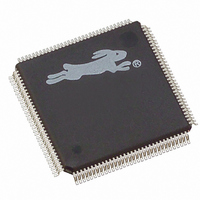20-668-0011 Rabbit Semiconductor, 20-668-0011 Datasheet - Page 41

20-668-0011
Manufacturer Part Number
20-668-0011
Description
IC MPU RABIT3000A 55.5MHZ128LQFP
Manufacturer
Rabbit Semiconductor
Datasheet
1.20-668-0011.pdf
(312 pages)
Specifications of 20-668-0011
Processor Type
Rabbit 3000 8-Bit
Speed
55.5MHz
Voltage
2.5V, 2.7V, 3V, 3.3V
Mounting Type
Surface Mount
Package / Case
128-LQFP
Data Bus Width
8 bit
Maximum Clock Frequency
55.5 MHz
Operating Supply Voltage
1.8 V to 3.6 V
Maximum Operating Temperature
+ 85 C
Mounting Style
SMD/SMT
Minimum Operating Temperature
- 55 C
Number Of Programmable I/os
56
Lead Free Status / RoHS Status
Lead free / RoHS Compliant
Features
-
Lead Free Status / Rohs Status
Lead free / RoHS Compliant
Other names
316-1061
Available stocks
Company
Part Number
Manufacturer
Quantity
Price
Company:
Part Number:
20-668-0011
Manufacturer:
Rabbit Semiconductor
Quantity:
10 000
- Current page: 41 of 312
- Download datasheet (2Mb)
4.2 Dependencies
4.2.1 I/O Pins
The CLK, STATUS, /WDTOUT, and /BUFEN pins are controlled by GOCR. Each of
these pins can be used as general-purpose outputs by driving them high or low:
• the CLK pin can output the peripheral clock, the peripheral clock divided by two, or be
• the STATUS pin can be active low during the first byte of each opcode fetch, active low
• the /WDTOUT pin can be active low whenever the watchdog timer resets the device or
• the /BUFEN pin can be active low during external I/O cycles, active low during data
The values in the battery-backed onchip-encryption RAM bytes are cleared If the signal
on the SMODE pins changes state.
4.2.2 Clocks
The periodic interrupt, real-time clock, watchdog timer, and secondary watchdog timer
require the 32 kHz clock.
4.2.3 Interrupts
The periodic interrupt is enabled in GCSR, and will occur every 488 µs. It is cleared by
reading GCSR. It can operate at Priority 1, 2, or 3.
The secondary watchdog interrupt will occur whenever the secondary watchdog is
enabled and allowed to count down to zero. It is cleared by restarting the secondary watch-
dog by writing to WDTCR. The secondary watchdog interrupt always occurs at Priority 3.
Chapter 4 System Management
driven high or low;
during an interrupt acknowledge, or driven high or low;
driven low; and
memory cycles, or driven high or low.
31
Related parts for 20-668-0011
Image
Part Number
Description
Manufacturer
Datasheet
Request
R

Part Number:
Description:
IC CPU RABBIT2000 30MHZ 100PQFP
Manufacturer:
Rabbit Semiconductor
Datasheet:

Part Number:
Description:
IC CPU RABBIT4000 128-LQFP
Manufacturer:
Rabbit Semiconductor
Datasheet:

Part Number:
Description:
Microprocessors - MPU Rabbit 3000 TFBGA Microprocessor
Manufacturer:
Rabbit Semiconductor

Part Number:
Description:
Microprocessors - MPU Rabbit 4000 LQFP Microprocessor
Manufacturer:
Rabbit Semiconductor

Part Number:
Description:
IC, I/O EXPANDER, 8BIT, 40MHZ, TQFP-64
Manufacturer:
Rabbit Semiconductor

Part Number:
Description:
SCRs 1.5A 200uA 400V Sensing
Manufacturer:
Littelfuse Inc
Datasheet:

Part Number:
Description:
CARD 6-RELAY SMARTSTAR SR9500
Manufacturer:
Rabbit Semiconductor
Datasheet:

Part Number:
Description:
WIRE-BOARD CONN RECEPTACLE, 6POS, 3.96MM
Manufacturer:
TE Connectivity
Datasheet:

Part Number:
Description:
ADAPTER 20 PIN .420" PLUGS(6PCS)
Manufacturer:
Logical Systems Inc.
Datasheet:

Part Number:
Description:
CONN BARRIER BLOCK .438" 20 POS
Manufacturer:
Cinch Connectors
Datasheet:

Part Number:
Description:
20 MODII 2PC HDR DR SHRD, ROHS
Manufacturer:
TE Connectivity
Datasheet:

Part Number:
Description:
WIRE-BOARD CONN RECEPTACLE, 6POS, 3.96MM
Manufacturer:
TE Connectivity
Datasheet:














